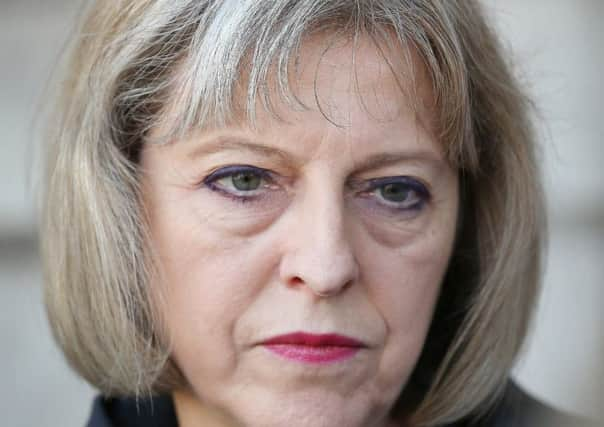Women among radicalised Britons fighting in Syria


Theresa May said last night that radicalised women were among an estimated 400 Britons to have left the UK to fight for an Islamic state.
Speaking at the Lord Mayor’s security and defence dinner, the Conservative minister also said that al-Qaeda-inspired terrorists in Iraq are “just a few hours’ flying time” from striking Britain “and want to attack us”.
Advertisement
Hide AdAdvertisement
Hide AdShe said Islamist fighters had carved out a “safe haven” in the Middle East, with “advanced technology and weapons” capable of threatening the UK.
Mrs May promised to revive government efforts to put forward laws to give MI5 and MI6 greater powers to deal with the “real and deadly” threats emerging from Syria and Iraq.
She told the audience: “The threats we face are considerable: the collapse of Syria; the emergence of the Islamic State of Iraq and the Levant [Isis]; Boko Haram in Nigeria; al-Qaeda in the Arabian Peninsula in Yemen; like-minded groups in Libya; al-Shabaab in East Africa; terrorist planning in Pakistan and Afghanistan; industrial, military and state espionage practised by states and businesses alike; organised crime that crosses national boundaries; the expanding scope of cyber.
“All these threats and many more should remind us of an obvious old truth: The world is a dangerous place and the United Kingdom needs the capabilities to defend its interests and protect its citizens.”
Highlighting what she believes is a need to allow MI5, MI6 and GCHQ access to private e-mails and online activity in the event of a security threat, she warned that the UK government is currently unable to deal with the threats the country faces.
She said: “The real problem is not that we have built an over-mighty state, but that the state is finding it harder to fulfil its most basic duty, which is to protect the public.”
Mrs May also rejected arguments that the security services are currently engaged in unaccountable mass surveillance of the British public, or that intelligence agencies are breaking the law to trawl online communications.
She said the growth of social media created three major problems. She said: “We are living more of our lives online, using an array of new technology – IP telephony such as Skype and FaceTime, social networking such as Facebook, Twitter and Instagram, chat rooms, anonymising services, and a myriad of mobile apps.
Advertisement
Hide AdAdvertisement
Hide Ad“This is hugely liberating and a great opportunity for economic growth, but this technology has become essential not just to the likes of you and me but to organised criminals and terrorists.”
The second problem she said was that the new technology is owned and operated by private companies. And she added: “Third far from having some fictitious mastery over all this technology we, in democratic states, face the significant risk of being caught out by it.”
SEE ALSO